That's all from uspublished at 13:15 BST 23 September 2020
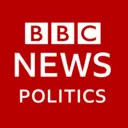 BBC Politics
BBC Politics
Thanks for watching along with us this afternoon.
Do join us again next week.
Boris Johnson and Keir Starmer faced each other at this week's PMQs
Furlough featured heavily, with Labour and the SNP calling for an extension to the scheme
Johnson said the government would “bring forward creative and imaginative schemes to keep the economy going” - but no extension
Sir Keir also accused the prime minister of “losing control of testing” and “losing control of the virus”
On Tuesday, the PM gave a televised address on new coronavirus restrictions
Johnson called on the public to "summon the discipline and the resolve" to follow the new rules
In Tuesday's TV broadcast, he warned the government may go further if people don't stick to the restrictions
Jennifer Scott and Kate Whannel
 BBC Politics
BBC Politics
Thanks for watching along with us this afternoon.
Do join us again next week.
 BBC Politics
BBC Politics
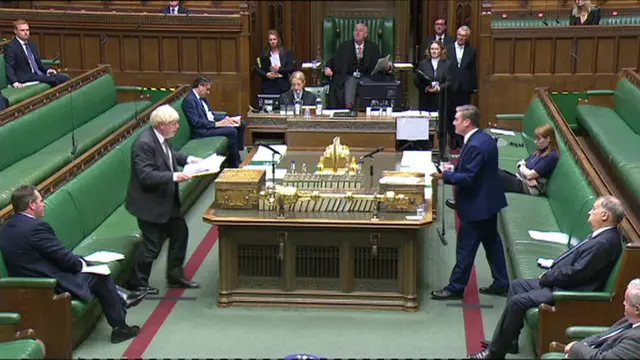 Image source, HoC
Image source, HoCThe Prime Minister defended his handling of the coronavirus pandemic.
Labour Leader Sir Keir Starmer accused the prime minister of “losing control of testing” , externaland “losing control of the virus”.
He said the prime minister was “really out of touch” with what parents were experiencing , externalwhen trying to get coronavirus tests for their children.
The prime minister said it was an “epidemical fact” that the virus spreads person to person and that testing capacity was at “at a record high”.
He said Sir Keir should stop knocking the testing regime “from the side lines” as it was important to “encourage people to believe in it.”
Both the Labour leader and the SNP’s Westminster leader Ian Blackford , externalcalled on the government to extend the furlough scheme beyond October.
Ian Blackford said workers were “facing the dogs” if the scheme wasn’t extended.
And Labour backbencher Grahame Morris said there would be a “tsunami of job losses” if a targeted expansion wasn’t brought it.
Mr Johnson said the government would “bring forward creative and imaginative schemes to keep the economy going” and “keep them in work”.
He said the “essence” of what the government was doing was to “depress the virus, keep pupils in school, keep economy going”
 Reality Check
Reality Check
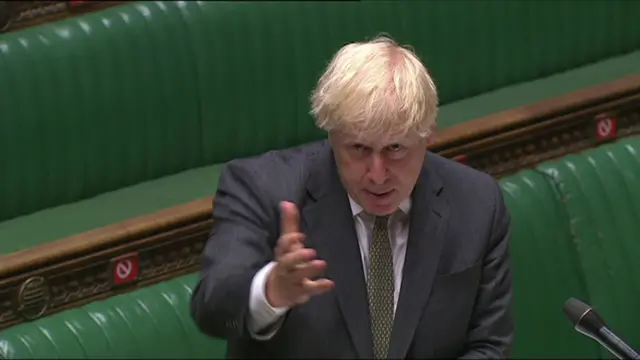 Image source, HoC
Image source, HoCThe PM said that testing capacity was "at a record high"
Prime Minister Boris Johnson said that “we're going to go up to 500,000 tests by the end of October”.
The testing target the government has actually set is for the “capacity” to do 500,000 tests a day by that date.
Capacity measures the number of tests labs are able to process in a given day. However, they have never actually processed that many tests.
For example, labs currently have capacity to process 264,000 tests a day, but in the most recent week - on average - 228,000 tests were processed. This means there was a 36,000 gap between testing capacity and tests processed.
The government has previously confirmed that the 500,000 target relates to swab tests to see if you currently have the virus, normally referred to as Pillar 1 and Pillar 2 testing.
With capacity at its current level, the target would see it almost double in just over a month.
It took roughly three and a half months to double it to its current levels.
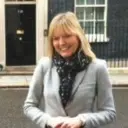 Ellie Price
Ellie Price
Political Correspondent
This PMQs really highlights the challenge facing the government with its handling of the country’s health versus its wealth.
Boris Johnson was asked repeatedly by Labour and SNP MPs about whether the government would consider extending the job retention scheme.
But he was asked too by some of his own MPs about whether the government would be able to do anything to help football clubs, the performing arts, and freelancers.
The list, of course, goes on for sectors that will be affected by six more months of tighter restrictions.
And their voices will only get louder.
We won’t have any idea if these new measures are working to reduce transmission rates for weeks to come.
 House of Commons
House of Commons
Parliament
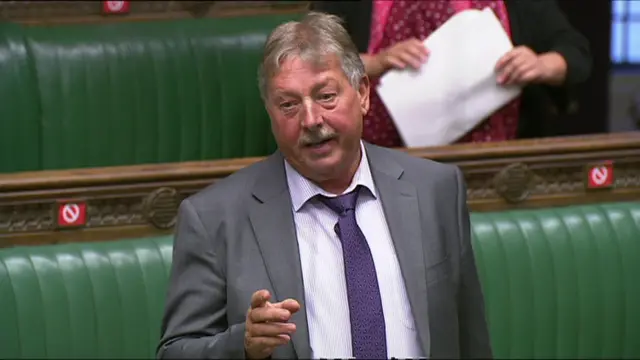 Image source, HoC
Image source, HoCThe final question of PMQs comes from the DUP's Sammy Wilson.
He says "only time will tell" whether predictions made by the government's science advisers earlier this week "have any credibility or whether they are exaggerated".
But he claims the "scare tactics being used and regulatory actions taken will have an immediate impact on high streets, the hospitality industry, and cause further devastation for aviation."
He asks the PM to promise continued support for businesses and devolved administrations during the crisis.
Johnson says the MP made "a powerful point of scepticism about the medical forecasts".
But he adds: "All I can say is everyone should look at what has already happened... and be in no doubt such a thing can happen again."
Repeating one last time that a "stitch in time saves nine", the PM concludes there will be "far more damage if we fail to control the virus now".
 Ellie Price
Ellie Price
Political Correspondent
Several questions about the pressures on football clubs big and small.
Restrictions announced last night meant the plans to allow fans back to stadiums in October have been postponed, probably for the next 6 months.
The prime pinister said the Secretary of State for Culture and Sport Oliver Dowden is actively consulting with clubs on what the government can do to help, so we can perhaps expect more news on this.
Allow X content?
This article contains content provided by X. We ask for your permission before anything is loaded, as they may be using cookies and other technologies. You may want to read X’s cookie policy, external and privacy policy, external before accepting. To view this content choose ‘accept and continue’.
 Reality Check
Reality Check
Several MPs have asked the prime minister about an extension to the furlough scheme.
Ian Blackford, leader of the SNP at Westminster, said: "The prime minister must announce an immediate extension... to this vital and life-saving scheme."
The furlough scheme was designed to protect jobs while businesses were unable to function. Initially, the government paid 80% of an employee’s salary up to a maximum of £2,500 a month. Now, employers have to pay 10% of the salary as well as national insurance and pension contributions. The scheme ends on 31 October.
As of 20 September, a total of 9.6 million employees had been furloughed at some point by 1.2 million employers at a cost of £39.3bn, external.
You can read more about the scheme here.
 House of Commons
House of Commons
Parliament
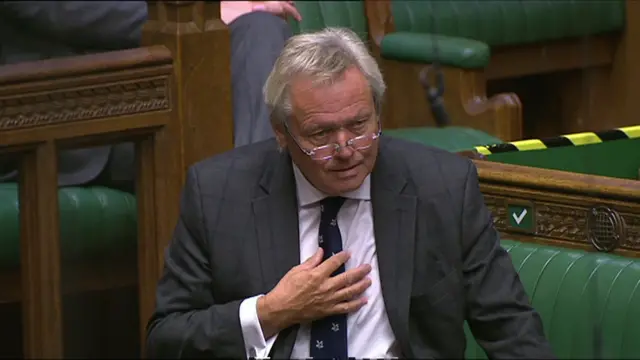 Image source, HoC
Image source, HoCFormer actor turned Tory MP Giles Watling makes a plea for the arts.
He says the UK sector is a "global gold standard and a vital showcase" of what the country offers.
But he says freelancers, such as actors and costumiers, have "fallen through the cracks" and need help from the government.
Johnson says they have already given £1.57bn to support the creative industries.
"We will do whatever we can to support the freelancers," he adds.
"They are the backbone of our theatrical world which, as he knows, is the jewel in the crown of the London cultural economy."
 House of Commons
House of Commons
Parliament
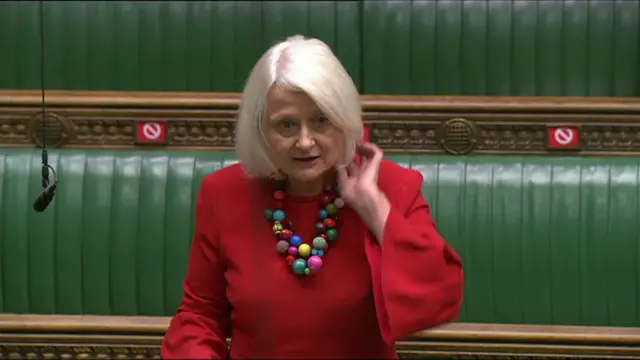 Image source, HoC
Image source, HoCLabour's Siobhain McDonagh says during lockdown a quarter of children on free school meals did "less than one hour of school work a day".
"Lockdown was temporary but the impact could be lifelong," she says and urges the prime minister to support her bill which would give children on free school meals access to internet in their homes.
"She is raising a very important point," the prime minister replies and says the government is investing "massively" in online education to close "the digital divide".
 House of Commons
House of Commons
Parliament
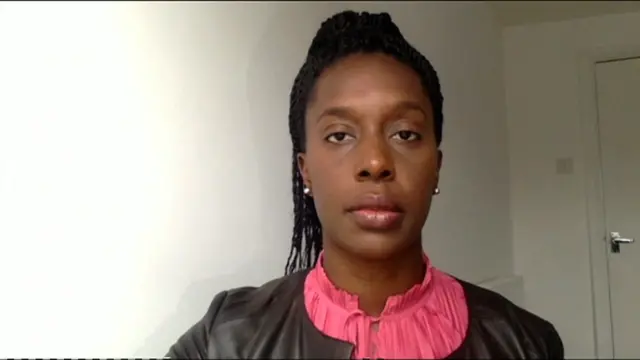 Image source, HoC
Image source, HoCJoining question time via video link, Labour's Florence Eshalomi raises the issue of unsafe cladding on buildings leaving people in her London consituency of Vauxhall unable to sell or remortgage properties.
It is an issue seen across the country in light of the horror of the Grenfell Tower fire.
She says people are being "trapped between risk adverse lenders and irresponsible building owners", and wants to know how the PM plans to "resolve this dangerous situation".
Johnson says he is aware of the problem, calling it "disgraceful".
He says the cladding "should come off as fast as it can" and the government was "investing massively" to make it happen.
 House of Commons
House of Commons
Parliament
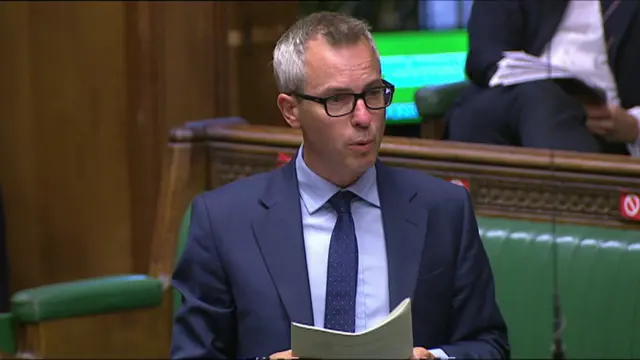 Image source, HoC
Image source, HoCConservative James Wild tells MPs that he was at Norwich City Football Club at the weekend, as part of a pilot to let fans back into grounds.
He says it is "disappointing" the return of fans has been postponed as many teams are "facing a real threat to their viability", and he urges the PM to consider a sports recovery fund.
"It grieves me to see football clubs not able to go back in the way they want to," Boris Johnson replies.
"I really wish we did not have to do this now," he says adding that his government is looking at solutions.
Allow X content?
This article contains content provided by X. We ask for your permission before anything is loaded, as they may be using cookies and other technologies. You may want to read X’s cookie policy, external and privacy policy, external before accepting. To view this content choose ‘accept and continue’.
 House of Commons
House of Commons
Parliament
The SNP's Patrick Grady will not let go of the furlough issue.
He tells the PM the government will be hit with the cost either way "whether they extend the job retention scheme or pay the long term price of long term unemployment".
He asks: "Which of those is it going to be?"
Johnson says his government will "intensify our support for every part of the union - from space ports to backing our armed services", but again does not give a furlough pledge.
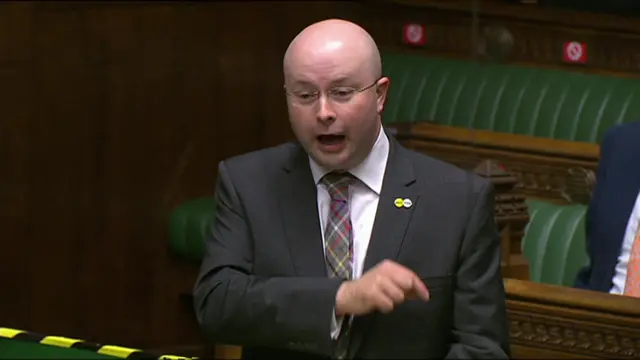 Image source, SNP
Image source, SNP Reality Check
Reality Check
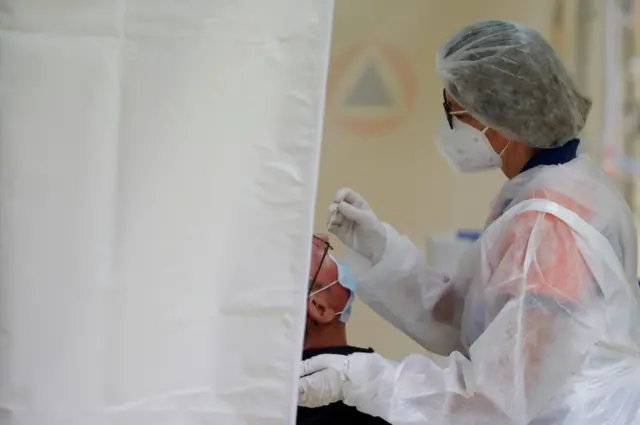 Image source, Reuters
Image source, ReutersBoris Johnson said at Prime Minister’s Questions: “we’re now testing more than any other country in Europe”.
He’s made the Europe comparison many times before.
Direct comparisons between countries on testing can be tricky, as countries don’t report their figures at the same time and there may be some differences in methodology.
But, in terms of overall tests to diagnose whether someone has coronavirus, he’s right – according to data collected by the European Centre for Disease Prevention and Control (ECDC).
Between 9 March and 6 September, its figures show:
On testing relative to the size of a country's population, the UK ranks highly (over the same period): UK did 246 tests for every 1,000 people compared with Germany which tested 160 per 1,000.
A handful of countries tested more though – including Denmark with 459 tests per 1,000.
We’ve looked at the comparisons in more detail here.
 House of Commons
House of Commons
Parliament
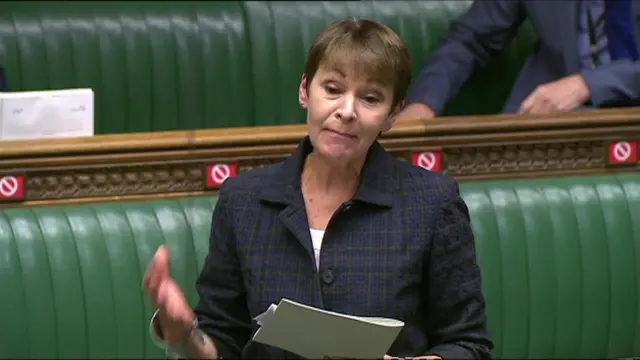 Image source, HoC
Image source, HoCGreen Party MP Caroline Lucas points to a report from the RSPB, saying there had been a "lost decade for nature", with the government failing to reach 17 out of 20 targets it had signed up to.
She says it is a "vital moment to put this right and show some real leadership".
Lucas asks the PM to sign up to a new pledge, protecting 30% of land and sea by 2030.
Johnson says she "simply cannot be unaware the campaign to get the world's leaders to sign up to a leaders declaration was led by this government".
He says they will continue to campaign on biodiversity, adding: "We will put in the funding."
 Ellie Price
Ellie Price
Political Correspondent
Keir Starmer used his last questions to ask about economic support, particularly the continuation of the furlough scheme for certain sectors.
The calls that are getting louder from lots of different voices, including the Governor of the Bank of England, the trade unions, and big and small business groups, and - as we saw with Ian Blackford's question too - other parties like the SNP.
 House of Commons
House of Commons
Parliament
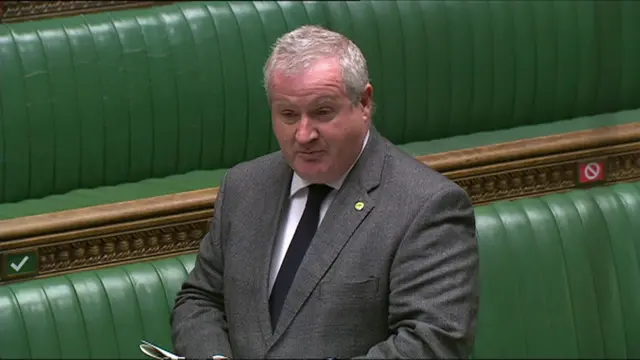 Image source, HoC
Image source, HoCPicking up where Keir Starmer left off, SNP Westminster Leader Ian Blackford also urges the PM to extend the furlough scheme, adding that "one million jobs could be at risk if furlough ends early."
"If those numbers become a reality the prime minister is leading us into another winter of discontent," he says.
Boris Johnson repeats his earlier assertion that the government "will come up with the appropriate and imaginative schemes to keep the economy moving".
"That is so poor," replies Mr Blackford and again calls on the PM to extend furlough and "stop one million workers being sold on to the scrap heap."
Mr Johnson says his government wants to "get people into work while suppressing the virus".
 Ellie Price
Ellie Price
Political Correspondent
No surprises the first few questions from Keir Starmer are about the government's handling of the test and trace system.
It's becoming a weekly feature and it's seen as a weakness for the government.
But don't forget Labour broadly back the tightening of restrictions - so no major criticism there.
Allow X content?
This article contains content provided by X. We ask for your permission before anything is loaded, as they may be using cookies and other technologies. You may want to read X’s cookie policy, external and privacy policy, external before accepting. To view this content choose ‘accept and continue’.